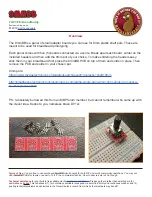
the guitar) by pushing it toward the input jack.
Remove the battery and replace with a new
one, paying close attention to the positive/
negative orientation shown inside the carriage.
Tip: Batteries can leak if left unused for
long periods of time. When you replace
your battery, write the date on it with a
permanent marker to track how long the
battery has been in the guitar.
Phase Switch
A phase switch has been included on the pre-
amp to help reduce low-frequency feedback
should it occur in a live situation. The switch
can be accessed through the soundhole of the
guitar and is located on the side of the circuit
board (see photo above). If low-frequency feed-
back becomes an issue in live performance,
changing the phase on either your amplifier or
the guitar will help resolve the problem.
Pickup Adjustments
The Expression System 2 utilizes three uniquely
positioned, individually calibrated pickup sen-
sors located behind the saddle. The individual
pickup pressures are factory set and will likely
only need to be adjusted if the saddle is being
removed or replaced. Pressure on each sensor
is controlled by turning the adjustment screws
(visible behind the saddle; see photo below).
The small, visible circles behind the bridge
contain tiny adjustable arms. The small adjust-
ment screws on top move the arms forward and
backward, increasing and decreasing the pres-
sure of the pickup sensors against the lower
rear portion of the saddle, similar to pushing on
a brake pedal in a car.
©2014 Taylor Guitars. All rights reserved. Prices and specifications subject to change without notice.
2449-6.2.14 2503-0030
1980 Gillespie Way El Cajon, CA 92020-1096 1-888-2TAYLOR taylorguitars.com
Note: The saddle should not be removed
or replaced without first loosening the
adjustment screws located on the top of
the pickup housings. Otherwise the pickup
could be damaged.
To remove the saddle: The pickup sensors
must first be loosened (backed away from the
saddle) by loosening the pressure adjustment
screws located on top of the housings behind
the saddle. The adjustment will require a .050
hex key (Allen wrench).
Not included.
Turning the hex key counterclockwise 1-½
turns will back the sensor arms away from
the saddle so it can be removed from the slot
easily. Once the saddle is placed back in the
slot, the pickup sensors can be reset with the
saddle by turning them clockwise 1-½ turns.
Fine Adjustment
Very light pressure on the sensors is all that is
needed to make the system work well. Changing
the tension on the sensors will change the timbre
of the sound and volume of the pickup slightly.
Approximately one full turn of the tension screw is
the maximum amount of pressure variance.
We suggest that any adjustments for sound be
made using the following process:
1) Plug the guitar in and turn the volume up.
2) While plucking sets of two strings at a time,
turn the adjustment screw associated with
those strings (E/A - D/G - B/E) one turn coun-
terclockwise until the sound of those strings
diminishes. This will loosen the pressure on the
sensor.
3) To engage the pickup for those strings, turn
the screw back again clockwise ¼ turn at a
time while plucking the strings until the sound
of the strings returns. This will increase the
pressure on the sensors. Repeat the process
for the other string pairings (D/G - B/E).
Additional Note: The pickup system is
held in place in the guitar by the
pressure of the sensors against the
saddle. If the pickup is accidently pushed
out during saddle replacement, it can
easily be put back into the bridge by
pushing it up through the three pickup
holes. The top of the pickup housing
should be flush with the top of the bridge
to be accurate.
Three pickup adjustment screws are located between the saddle and bridge pins
A phase switch located on the circuit board
helps reduce low-frequency feedback
Expression System 2
battery carriage




















